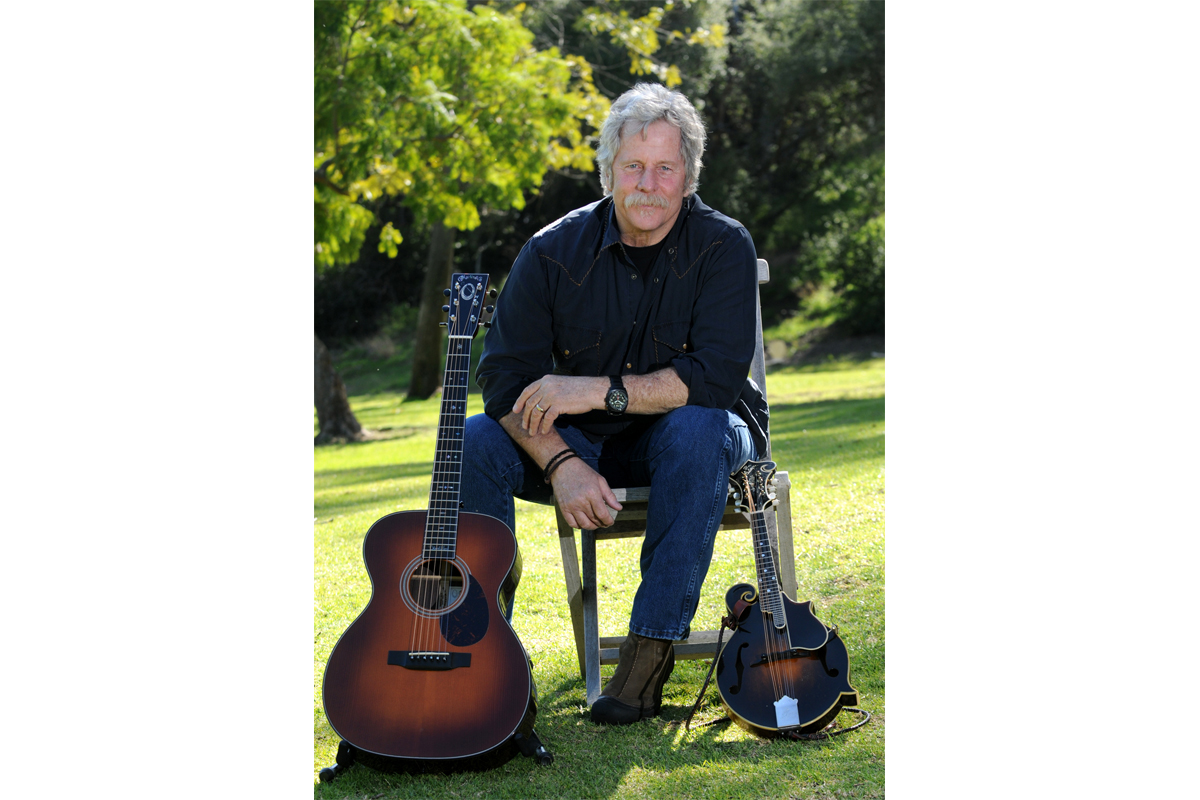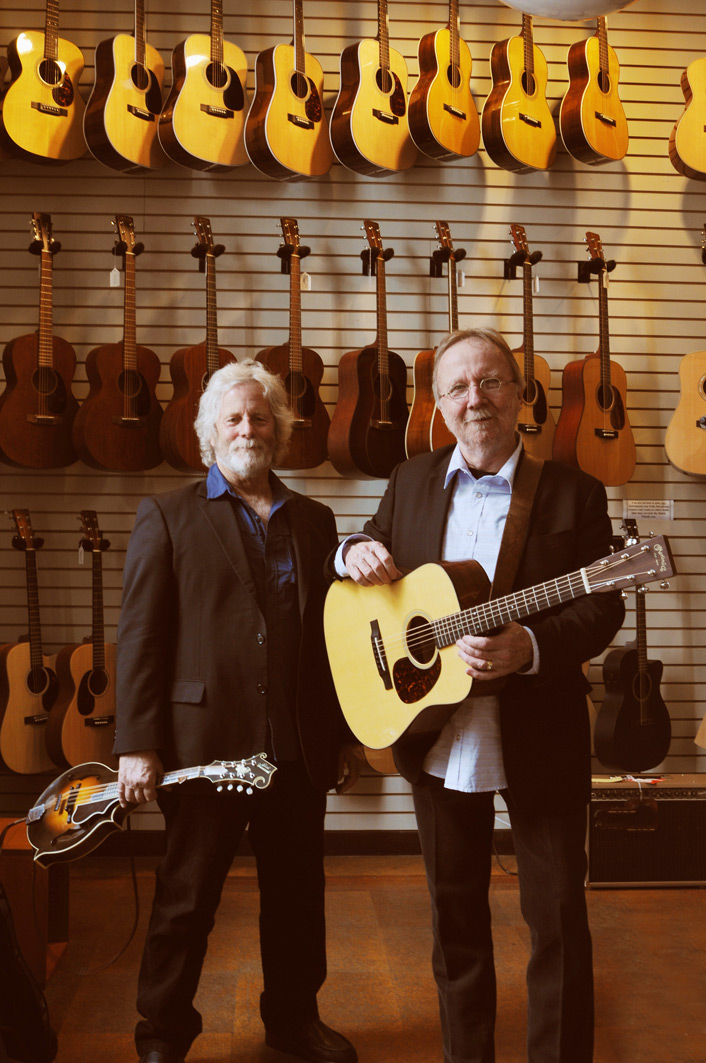Chris Hillman Talks New Album, Tom Petty, and Thomas Fire
Cofounder of the Byrds to Play Benefit Concert for Victims of Thomas Fire.

Chris Hillman is a national treasure. Along with fellow founding members of the Byrds — Gene Clark, Roger McGuinn, David Crosby, and Michael Clarke — Hillman pioneered jingle-jangly folk rock in the 1960s by melding elements from the music of Bob Dylan, Pete Seeger, J.S. Bach, and the Beatles. With Gram Parsons, Hillman helped steer the Byrds in a country-rock direction on the band’s classic album Sweetheart of the Rodeo before he and Parsons formed the Flying Burrito Brothers and ushered in “Cosmic American Music.”
Later in his career, Hillman joined Stephen Stills in Manassas, teamed with Richie Furay and J.D. Souther in the short-lived Souther–Hillman–Furay Band, and formed the fantastic bluegrass and country group the Desert Rose Band with Herb Pedersen and John Jorgenson. During the 1990s, Hillman reunited with Crosby and McGuinn — and was inducted into the Rock & Roll Hall of Fame as a member of the Byrds. In 2017, Hillman’s latest album, Bidin’ My Time, coproduced by the late, great Tom Petty and Pedersen, was released to positive reviews.
I recently spoke with the affable artist over the phone ahead of his upcoming Thomas Fire benefit concert Friday, February 16, at the Lobero, about his great new album, and memories of the Byrds and Gram Parsons.
I really love the energy and flow of Bidin’ My Time. Your singing voice is in fine form, and the balance of new material, the revisiting of Byrds classics, and covers testifies to your legacy as a pioneer of many genres. How many songs had you been stockpiling? How did Tom Petty get involved? I had a couple of songs — “Restless,” “Given All I Can See,” and “Such Is the World We Live In” — lying around. A couple of songs I had written in the late ‘80s: One was “Bidin’ My Time,” and the other one was “Different Rivers,” but I was sort of done with it all. Then, through Herb Pedersen, I had a couple of conversations with Tom a year ago …. He said, “Let’s go cut a few tracks and see what happens. We’ll have a good time, and we’ll use my studio.” We started cutting tracks … and it sort of morphed into an electric/acoustic album as the Heartbreakers joined up and got on board. It was one of the more rewarding projects I’ve ever done. He was a joy to work with.

You also do a splendid cover of The Everly Brothers’ tune “Walk Right Back,” which has a Django Reinhardt–style jazz-manouche flavor. How did you decide on that? That was just Herb and I goofing around in the studio while they were getting ready to set another track. And Tom was in the booth and came running out and said, “We gotta cut that track right now!” I said, “Are You kidding?” He said, “No, let’s cut it right now. Just stop what we’re doing, go in there, and record it.” So, we did. John [Jorgenson], besides being a great rock, bluegrass, and country musician, is a phenomenal “gypsy jazz” player in that Django Reinhardt style. I thought that was one of his greatest solos. Tom understood music so well — he told John, in the studio, “Just go for the solo, don’t come back in and overdub it.” And I love that!
Your tribute to Tom Petty through covering his beautiful song “Wildflowers” is quite moving. Can you speak a bit about your friendship with him? People around the world loved the guy — he was just such a down-to-earth, very honest and great musician. I told him, “For you to have the same guys working for you for 40 years, the same crew, speaks a lot about you as a person. He went, “Ahhh,” and shrugged it off. I was devastated when he died …. I couldn’t put my mind around that for a while. I had four shows left on this particular leg of the tour, and I was gonna cancel. And then I get a call from Crosby, asking about Tom’s passing. And then Roger McGuinn called me, and we were talking, and he said, “You can’t cancel these shows. The last thing he would have wanted was for you to not play. Go out and celebrate him through your music.” And I did.
How was it collaborating with David Crosby and Roger McGuinn and playing bass again? Dave has come and sung with me on a few things that I’ve done; he’s always there to help …. We’re all good friends. So, David gladly came in and sang “The Bells of Rhymney” with Herb and me, and it came out great — I always wanted to do a song with the two of them; they’re such good tenor singers. And Roger and I had written “Here She Comes Again” back in 1979, and we never recorded it. It had that early Byrds feel to it. That’s where we used the Heartbreakers, and I played bass — it was a lot of fun pulling the bass out of the closet and plugging it in after 20 or 30 years of not touching it. That came out good. I had a great time, and Steve Ferrone is a great drummer, so that was a pleasure working with him, and then Benmont Tench and all the guys. And Tom played guitar on there, too!
On the Byrds’ 1967 album Younger Than Yesterday you went from being a killer bassist to contributing songs. What made you suddenly blossom as a singer/songwriter? How crucial was Clarence White’s guitar playing on several of your songs? “Time Between” was the first song I wrote — lyrics and music. I don’t know what happened, but somehow the gates swung open. I always say it was working for Hugh Masekela, playing bass for these demo sessions he was producing on this South African jazz singer, Letta Mbulu. It was so much fun playing with all these South African players. … I came home, and I started writing songs. On “Time Between,” there was a phenomenal solo [White] took. This is before he had a StringBender — that thing he was known for later on. This was just straight out of the amp. He comes in with his Telecaster, plugs in to his Fender Twin — or whatever it was — and played the solo. And it was just so good. Then he played on “Girl with No Name.” He was one of those very special people who had the gift!
I really love your “She Don’t Care About Time” tribute to fellow Byrd Gene Clark. What made you choose that song? I always wanted to record that song because, remember, when Gene wrote it he was about 19 or 20. And I was as amazed then — 50 plus years ago — as I am today. That lyric is so substantial, so beautiful. I mean, where did he come up with that? It’s just amazing, so I wanted to do it.
What about Gram Parsons and your time together in the Byrds and the Flying Burrito Brothers? How was it composing classic songs such as “Sin City,” and “Christine’s Tune” together? Gram —I think I got to work with him at his very best. He was a good writer and came into the Byrds with two wonderful songs — “Hickory Wind” and “100 Years From Now,” which we recorded on Sweetheart of the Rodeo. But the best part is I had this wonderful ally that came out of country music, loved country music, understood it — as I did. And so, I had somebody I could really relate to … and it went into the Flying Burrito Brothers. Gram was a very talented guy — very funny; very bright! And we wrote some great songs together … like “Sin City” and all those … that held up over the decades. He got swallowed up by excess — all the negative, dark stuff around the business. It got to where we were having issues and couldn’t work together. He did some nice things with Emmylou Harris later, but it was never up to the quality that he did when we were first writing together for the first Burrito Brothers album.
Thank you for all of your contributions to great music in multiple genres. Is there anything you’d like to add about your amazing journey so far? I actually have a memoir that’s pretty well done. It’s about my journey … and growing up in California in the ‘50s … and how I got into music and I just had a passion for it, and all of these wonderful opportunities that came along for me … I wrote about working with different people, and anecdotal things … I just have to finish it … and I’ll see if somebody wants to publish it.
I had some wonderful people I learned from. McGuinn and Crosby were fantastic —as was Gene. Michael Clarke was a lovable guy. There were times when he was not really that good on the drums, and then there were times when he was brilliant — like on “Eight Miles High.” Stephen Stills, when I worked with him, he was at the top of his game. I’ve lost a lot of good friends, and I have no animosities toward anybody at this point in my life … I love David and Roger, and I wish Mike and Gene were still around … we probably would have put the Byrds back together for one last album.
The last conversation I had with Tom Petty, we were sitting in the studio, and we were listening to the mixes [of Bidin’ My Time] — it’s done … and Tom said, “I have other plans for you…we’re gonna do some more work … we’re gonna do some rock ’n’ roll stuff,” and I thought, okay, that would be fun!
What prompted your upcoming benefit concert with Herb and John at the Lobero Theatre? I came out of the Thomas Fire in Ventura. I don’t know how we survived, but we did …. Everybody around me, my neighbors, everything was gone, burnt to the ground. But my house was still standing — except most of the kitchen was burned. I mean, I look at my neighbors, and I can’t complain about anything …. They lost so much. So, we already had the Lobero booked, and I decided, I’m going to give this money to a charity for victims of the Thomas Fire — whatever we can do to help.
4·1·1
Chris Hillman, Herb Pedersen, and John Jorgenson play a benefit concert for victims of the Thomas Fire on Friday, February 16, 8 p.m., at the Lobero Theatre (33 E. Canon Perdido St.). Call (805) 966-4946 or see lobero.org.



